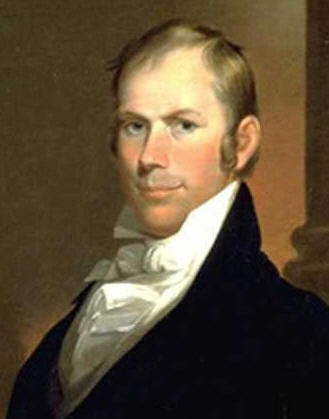 Henry Clay
Lucrative lawyer and silver tongued politician known for his brilliant
speeches. Candidate for President several times.
Henry Clay
Lucrative lawyer and silver tongued politician known for his brilliant
speeches. Candidate for President several times.
He was born 1777 in Virginia. In 1792, he held a clerk's job in Virginia high court of chancery where he met George Wythe who directed his reading. In 1803-06, he served in the Kentucky legislature. In 1806 and 1809, he was elected to Congress, becoming Speaker of the House of Representatives in 1811.
He used his great oratory talents to stir enthusiasm against Britain's attempts to regulate American activities to help bring on the War of 1812. He was very active in negotiations for the treaty of peace at Ghent.
In 1815, he was again elected to Congress to become Speaker of the House where he began a national program that ultimately included federal aid for internal improvements and tariff protection of American industries.
In 1821, Clay authored and pushed the Missouri Compromise (restricted slavery to the states south of 30º30º N. latitude) through the House.
As a presidential candidate in 1824, Clay had the fourth largest number of electoral votes. He was eliminated; and the election went to the House where the three highest were to be voted upon. Clay was instructed by the Kentucky legislature to vote for Jackson but he did not. He despised Jackson and refused to vote for him, casting his vote instead for John Quincy Adams. Clay, under the successfully-elected President Adams, was appointed Secretary of State, which Jackson supporters found very suspicious. Jackson's friends charged Clay with political corruption. The accusation, though unproven, sullied Clay's reputation enough to stilt his future in politics.
In 1828, Andrew Jackson defeated Adams in the next presidential race. Clay was elected (1831) to the U.S. Senate to lead the National Republicans or Whigs who were opposed to Jackson's policies. In the next election, Clay fought against Jackson, but Jackson was overwhelmingly re-elected.
Clay opposed Jackson on several levels, including the bank issue. When Jackson had the deposits removed (1833) from the Bank of the United States to other banks, Clay in the senate passed a resolution censuring the President for his act. The resolution was later deleted from the record.
In 1836, Clay opposed Van Buren's administration in vain. In 1840, Clay supported William H. Harrison, Whig party candidate for President; and when Harrison was elected, Clay was again asked to be Secretary of State. He decided instead to stay in the Senate where he planned to re-establish the Bank of the United States. However, John Tyler unexpectedly became President, and he vetoed Clay's bills. Clay resigned his Senate seat.
In 1844 he (Clay) ran against James K. Polk, an avowed expansionist. Clay opposed the annexation of Texas, but he later agreed to its annexation only with the consent of the Union and without war. Again, he lost the election. Theodore Frelinghuysen, Clay's running mate, wrote to the deeply disappointed Clay, "As sinners, who have rebelled against our Maker, we need a Saviour or we must perish....Let us then repair to Him." Henry Clay had spent his life excluding God and now seemed ready to listen. He did some heart-searching and realized that pleasures of the world could not satisfy the soul of man. On June 22, 1847, he was baptized.
In 1849, he once again became a Senator when the country faced the slavery question in the territory newly acquired following the Mexican War. Clay was instrumental in shaping the compromise of 1850. His strength waning, Clay spoke of his "abiding trust in the merits and mediation of our Saviour" and "full faith in the great leading doctrines of the Gospel." Clay spent his last days reading the Bible and thanking God for His blessings. Even long-time critics aware of his past political tricks and eaubrucheous affairs recognized the change in Clay. He died in 1852 saying that he had no "apprehension of death...I am read to go whenever it is the will of God that I should be summoned hence." See: Copyright ©1999, The Austin American-Statesman, & Marvin Olasky, 5-26-1999 http://www.acton.org/ppolicy/editorials/olasky/graduation.html
Clay, a slave owner who favored emancipation, advocated a gradual approach. "I implore, as the best blessing which Heaven can bestow upon me upon earth, that if the direful and sad event of the dissolution of the Union shall happen, I may not survive to behold the sad and heart-rending spectacle." Closing Prayer of Henry Clay, Speech before the U.S. Senate on the Compromise Resolutions, 1850 Life and Speeches of Henry Clay, Vol. II, page 664.
 Image
in public domain
Image
in public domain